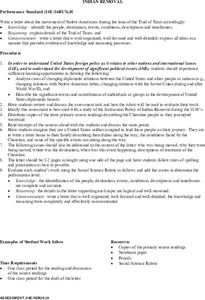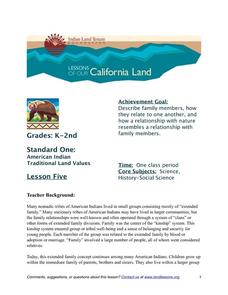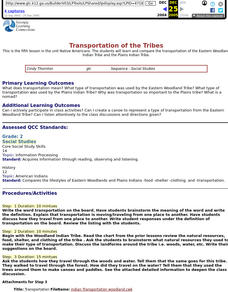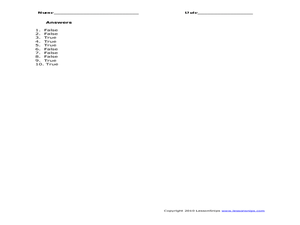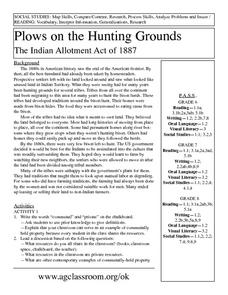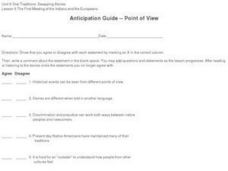Curated OER
Indian Removal
Students investigate the historical events surrounding The Trail of Tears. They write a letter that identifies the people, destination, events, and descriptions surrounding the timeframe. Students provide a written summary of the history...
Curated OER
Ute Indians: Past and Present
Fourth graders study the history of the Ute Indians. In this Ute Indians lesson, 4th graders complete a KWL chart about Ute Indians and read the online Ute Indian Fact Sheet. Students study examples of Ute culture, where the Ute Indians...
Curated OER
Wisconsin History and Information
Fourth graders complete a multi-faceted project about the people, places, and government of Wisconsin. Working with traditional and technological resources, they research various topics related to the history of Wisconsin and create a...
Curated OER
Wappo Indians of Napa County
Third graders describe the American Indian nation in their local region long ago and in the recent past in terms of national identities, religious beliefs, customs, and various folklore traditions. They synthesize their findings into a...
Core Knowledge Foundation
Maya, Aztec, and Inca Civilizations
Here are a series of lessons on the Mayan, Aztec, and Incan civilizations. This incredible, 15-lesson unit would be perfect for any fifth grade study on these important civilizations. Learners focus on the complex nature of the cultures,...
Indian Land Tenure Foundation
Relationship with Nature
After a class discussion that focuses on kinship and extended family, young learners explore how Native Americans have lived in clans and other forms of extended family divisions. Pupils also see how Native Americans relate to the...
Curated OER
Understanding Points of View
Investigate the importance of author's point of view. Young linguists study primary source documents related to the Treaty of Casco Bay. The first source is authored by the Native American Chiefs, the second by an English...
Curated OER
Sand Painting Mural
Third graders design and create classroom sand painting mural which is comprised of individually designed pieces.
Curated OER
Talking Rocks
Third graders explain the difference between Petroglyphs and Pictographs from Ancient Native American peoples. They create symbols that are representative of a story about their world.
Curated OER
Timeless Totems
Students respond an email from Roger Totem, who is the curator of a new museum opening. students discuss with the art teacher to explain the project and get support. Students, in accordance with the guidelines, divide into groups...
Curated OER
Plains Indians Pictographs
Students explore methods of written communication. In this Plains Indian instructional activity, students create pictographs representing everyday modern life after observing the pictographs used by the Plains Indians. Pictograph stories...
Curated OER
Intermediate Level Lesson Plan THEMATIC ESSAY
Students identify three reasons why conflict arose in the Western United States during the late 1800s. Using specific examples, discuss how the United States government attempted to resolve these conflicts. Evaluate whether these...
Curated OER
Transportation of the Tribes
Second graders compare the transportation system of the Eastern Woodland Indian Tribe and the Plains Indian Tribe. They use a chart imbedded in this lesson to further their understanding of the Plains Indians, then engage in a craft...
Curated OER
Alaska's Native Population: Eskimos, Indians and Aleuts
Students explore the unique population of Alaska. In this Native people of Alaska lesson, students discover the three groups of people who live in Alaska. Students describe the similiarities and differences between the three groups....
Curated OER
Utah: State History
In this Utah state history activity, students read two and a half pages of information about Utah and complete 10 true and false questions.
Curated OER
The History of Money
In this social studies worksheet, young scholars investigate the history of paper money and coins. Students read paragraphs about what early people used for money and what kinds of banks were used. Young scholars complete a crossword...
Curated OER
Hawaii: State History
For this Hawaii state history worksheet, 4th graders read three pages of state history then complete 10 true and false questions.
Curated OER
This Land is My Land, That Land is Your Land!
Students explore the Native American migrant experience in the United States. They define and describe reservation and the relationship between the U.S. Government and Native tribes through individual textbook research and class discussion.
Curated OER
Learning By Looking: Pueblo Indian Ceremonial Dances
Students investigate the uses of ceremonial dance in the Pueblo Indian culture by viewing videos of native dances. They listen to folk tales that explain the dances and compare the traditions of the Pueblo culture to their own culture....
Curated OER
The Lake Champlain Highway
Ninth graders read and color “Boats, Boats, Boats on Lake Champlain.” In this US History lesson, 9th graders listen to more detailed descriptions of the history of boating on Lake Champlain. Students draw a picture of a boat used today.
Curated OER
The Study of the Main Tribal Nations of North Dakota
Fourth graders compare the tribal nations of North Dakota. For this tribal life lesson, 4th graders explore the many different tribes native to North Dakota. By the end of their study, students should be able to explain how the tribal...
Curated OER
Plows on the Hunting Ground
Third graders read and discuss the "Indian Allotment Act". Students compare communal and private property we have today. Students research Indian tribes online and write about their way of life and traditions during the 1880s. ...
Curated OER
Anticipation Guide -- Point of View
In this perspective worksheet, students reveal their agreement or disagreement about 6 statements in light of the first meeting between American Indians and Europeans.
Curated OER
American Indian Reservations
Fifth graders examine life on American Indian reservations, and discuss how confinement on the reservations affected American Indians. They visit the Bureau of Indian Affairs website, and develop positive and negative impact charts about...


